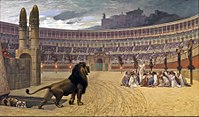The Diocletianic Persecution was the last and most severe persecution of Christians in the Roman empire. In 303, Emperor Diocletian and his colleagues Maximian, Galerius, and Constantius issued a series of edicts rescinding Christians' legal rights and demanding they comply with traditional religious practices. Later edicts targeted the clergy and demanded universal sacrifice, ordering all inhabitants to sacrifice to the gods. The persecution varied in intensity across the empire—weakest in Gaul and Britain, where only the first edict was applied, and strongest in the Eastern provinces. Constantius' son, Constantine, on taking the imperial office in 306, restored Christians to full legal equality and returned property confiscated during the persecution. The persecution failed to check the rise of the church. By 324, Constantine was sole ruler of the empire, and Christianity had become his favored religion. Although the persecution resulted in the deaths of—according to one modern estimate—3,000 Christians, and the torture, imprisonment, or dislocation of many more, most Christians avoided punishment. The persecution did, however, cause many churches to split between those who had complied with imperial authority (the traditores), and those who had remained "pure". Modern historians have tended to downplay the scale and depth of the Diocletianic persecution.
